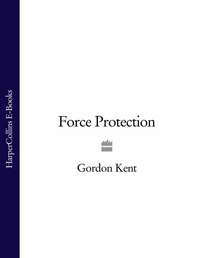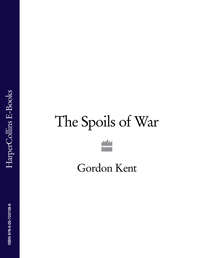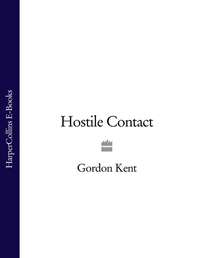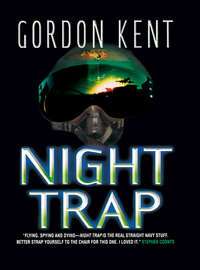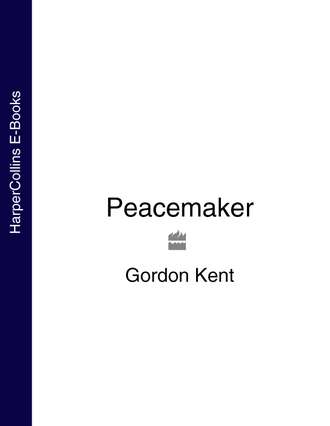
Полная версия
Peacemaker
“You want me?”
“I want you to believe in your intelligence. Enough to go along, I mean.”
What had Suter said? He was going to keep Alan away from anything that even smelled like glory? He grinned. “Count me in. As an observer, of course.” He didn’t say that he might be risking a court-martial.
The Kenyans and the Italians looked at each other.
“When?”
Alan thought about his own orders, about how long it would take Suter to figure something out. “Soon,” he said.
The Italian officer murmured, “If I give my colonel time to hear about it before we do it, well—”
The Kenyan surgeon said, “Tomorrow.”
“Tomorrow dawn,” Alan said.
The three of them looked at each other. They shook hands. He turned the problem of the helos over to the Italian captain and went back to the Kenyan hospital and spent time interviewing the civilians, getting as much hard data as he could on the house in Pustarla. Murch would be putting together a route, he hoped; he should have the latest data on Serb positions and air defenses. Alan’s belief from shipboard intel was that there was no air defense, but out in the Med he hadn’t paid a lot of attention to this hate-filled line where Bosnian Muslims and Bosnian Serbs were supposed to divide themselves, and people who happened to be in the minority on either side were being terrorized.
Then he went down the mountain again and used Murch’s computer to write a report on suspected war crimes and criminals in the Bosnian-Serb Pustarla region, pulling in this and that from Intelnet, creating a nice little package of the kind that admirals liked to be briefed from—maps, pretty pictures, juicy quotes from victims. Murch had marked out a route and made a real briefing packet he could use with the troops. He was liking Murch again.
“You got a journalist in your pocket?” he asked Murch.
“Are you wacko? Jesus, Craik—!”
“Wassamattayou? You never heard of PR? Nothing covers your ass like a news report, Murch.”
“Suppose this bombs out?”
Alan had thought about that. “If you’ve got a journalist in your pocket, it’ll come out as a victory no matter what. I’ll get some color photos for him, give him the story, exclusive. He’ll kiss my ass if I ask him to. Yes or no?”
“My boss—”
“Fuck your boss! Yes or no? If the story is out quick, nobody will dare bitch. ‘Brave UNPROFOR Forces Score One for Humanity!’ Come on!”
Murch rubbed his jaw. “There’s a Brit named Gibb, he’s okay, he—”
“Tell him to be at my Humvee in ten minutes. He can watch the prep and he can be there when it’s over, first to interview the brave troops and all that crap. He cannot go along. I’m outa here.”
Then he went back up the mountain, the journalist Gibb laughing nervously as the Humvee spun mud and gravel into the black gulf at the edge of the road. Gibb was on something, might have been a better companion if he hadn’t been, but Alan suspected the man was strung out like everybody else, thought he needed help—whatever gets you through the night. Alan left him in the Kenyans’ civilian ward. He spent half an hour with the hawk-faced captain and the Kenyan surgeon and a cluster of men in battle dress, planning. It was going to be kept simple, except nothing involving death is ever simple. The captain was unhappy about the armored vehicle but didn’t want to use anti-tank rockets—they had old Canadian Hellers—which he thought might go right through the meager armor without exploding. He was taking bullet-trap grenade launchers with HEAT, instead. Alan frowned when he heard but muttered, “Well, it’s your call.” Except that he would be there, too.
Two Ukrainian Mi-26s “diverted” from Zagreb would come in at 0300, and Alan would brief their crews. Off at 0445. Seven hours from now.
He slept.
When he woke, he reached for Rose and murmured her name. His hand felt the grit of the floor and he remembered where he was, a cot in the company office. Through the door, he could see men in flight suits and hear their talk, all charged up. The chopper crews. He had slept right through their arrival. Sitting up, he felt how tired he really was, and he thought, This isn’t a good idea. I’m wiped. But it was too late.
He put his wallet and his tags in his pack, checked himself for anything that would show he was American. His watch. His wedding ring; it came off hard, and he sucked the knuckle and got it off with the spit. Reluctantly, he put the Browning in the bag; he wanted to carry it, but it had been his father’s and had personal engraving on it. Even his skivvies, which had a label. Then he dressed from the skin out in stuff the Italians had given him. No rank marks. This is really stupid, he thought. He pushed the pack toward the Italian captain. “If something happens—I’m anonymous. My people will figure it out.” He wrote a couple of lines to Rose and stuffed the paper in the pack and pushed away the thought of what she would say if she could see him. Then he was on.
“It’s a short trip, gentlemen—ten miles in, ten out. I figure six minutes’ flying time each way, including diversion. The target is a house in a village called Pustarla, just one street and a few houses around it. Problem: there’s deep snow everywhere. Roads around the place took a week to get plowed, then some of it was done with horses—we got aerial photos. Only two sure places to put down a chopper, the town soccer field, which I’ve marked Bravo, and this smaller place marked Alpha, which is cleared—for a helo, we think, but the helo wasn’t there yesterday. We believe no land mines. It’s a hundred meters from the target; the soccer field is close to four hundred. The village street is a mess—ruts, ice, high banks. The police station is three hundred meters farther along; there should be ten to twelve guys there, well armed, capable. Respect them! They’ve got two armored cars, one probably inoperable because it hasn’t been dug out of the snow.
“We’re going in to Alpha as our primary landing zone; Bravo is backup and will be where the helos go if there’s trouble while the troops are at the target. That would leave us four hundred meters to cover on foot to get out.” He didn’t like that part. Four hundred meters could be a long way in snow.
“If the Yugoslavs scramble aircraft, they’re only fourteen minutes away. However, if they do that they’re going to get pasted.” Deny Flight was still on under a different name, the pilots impatient because nothing much was happening in deep winter. The F-16s and F-18s, Jaguars, Hornets, Tornados, and Fighting Falcons of several countries would love it if the Serbs scrambled so much as a flying chicken.
The Ukrainian choppers had come with crews and their own ground defense, two tough guys each with squad weapons. Alan made sure there would be room for prisoners and material coming back, double-checked with the Kenyans and the Italian ground troops. It would be tight: the Kenyans had insisted on sending two medics per helo; they wanted in on the action. The Italians were sending twenty altogether, two teams they had decided to call Romulus and Remus. Oh, shit, why not? Gagliano had told him that the Dutch had a mortar unit up the hill that was itching to put stuff over the border if the militia there made a move; the Canadians would have two electronics surveillance F-16s in the air, with the new US Air Force operation at Tuzla on alert. Certain shrugs, looks, and evasions suggested that the operation had been put together the way crucial spare parts were sometimes got—what was called “moonlight acquisition.”
“Captain Gagliano will brief you on the operation itself. I want to remind everybody—everybody—of what we’re after: intelligence. One, prisoners; two, electronics—computer stuff, direct links, comm, anything; three, records, including photos. We’re going to go in, grab what we can, and get out. If we have to shoot up somebody who happens to be a war criminal—” He looked around. “Sending messages is part of intelligence, too. I don’t object to sending a message.” Somebody guffawed.
Translations were going on all over the tent. The Kenyans and Italians had already got together with the Ukrainians, and they’d cobbled up some kind of signal system, with somebody who could speak English on each team. Still, it would be hairy, he thought. Speed, they had to emphasize speed. Surprise and speed, and baling wire and spit.
The big helos pounded south from the takeoff, seeming for three minutes to be heading back toward Srebnik, as if they might be taking hospital cases out. Then they cut sharply east, then east and north, two hundred feet off the deck. It was still dark, but the first light made the eastern horizon visible. The chopper interior smelled of metal and hot oil and sweat. Somebody passed gas, not helping matters at all.
“Four minutes.”
The word went along the helo, quattro minuti, quattro minuti.
Alan was in the second helo with the Kenyan surgeon and the hit team, Remus. Gagliano was in the lead aircraft with the Romulus team, which would protect against the police. They had two shooters with shoulder-fired antitank weapons, at least one guy with a rotating rocket grenade launcher. If things went right, Romulus would already be on the street when Alan’s helo touched down.
Thirty seconds on the street, he thought, forty-five max if the ruts are bad. How long did it really take you to trot a hundred meters in full battle gear? He shifted uneasily. The Italian body armor felt strange; so did the helmet. NATO gear, but not quite right, somehow. He was too thin for the body armor. He had a 9mm Beretta in a holster, a weapon he’d never liked as well as the Browning. Different safety, different trigger pull. If he had to use it, it would be in close, fast. Not good with an unfamiliar gun. What was he doing here, anyway?
“One minute.” Uno minuto, uno minuto …
He would be among the last out, only the Kenyans behind him, then the Ukrainian rangers who would stay with the chopper. He put his hand on the buckle, ready to unstrap. Where were his gloves? On his hands, of course. It was cold out there. Strange weapon, gloves, Christ—
“Thirty seconds.” Trenta secondi—
“Avanti!”
He watched the Italians bail out; they emptied the chopper like apples coming out of a basket. Alan jumped into the dark after them and hit the snow running, staggered, felt somebody hit him from behind, and he was up and following the dark line of figures ahead of him. They weren’t trotting, they were sprinting, or so it seemed. Somebody passed him, too eager. He whispered, “No—” It must be the Kenyan medics. “Polepole, polepole—” But they surged ahead of him. Only Doctor wa Danio back there now, floundering a little in the snow.
They came out into the village street. It felt like a tunnel, the snowpiles high on each side, thrown up there with shovels, tree limbs overhead like fingers, then charcoal sky. It was lighter in the east, noticeably so now. Faint lights showed in a few of the houses, maybe not even electric, but they were mostly blocked by the snowbanks. He slipped in a frozen rut and almost went down; ahead of him, the Italians were sliding, lurching. His feet made loud crunching noises, like the other feet, all out of step as he’d briefed them so there would be no pounding rhythm. Otherwise, it was silent. Not a tunnel but a tomb. A tomb with running men, running figures that would have been dark shadows moving through their town if anybody had seen them. Ghosts in NVGs.
A cow was walking down the other side of the road. Its breath came out in steamy puffs. Suddenly, it frisked to the side, stood splay-legged, staring at them. It jumped again, then tried to run back up the street, sliding.
He was hyperventilating now. Only a hundred meters, and he was puffing as if he was running the mile. Too fast, too fast, he thought. He didn’t dare look at his watch, fearful he might fall. Then he was at the driveway that ran up to the house, which had been somebody’s pride once, a sign of some kind of wealth in this pitiful place. The house stood back among some scruffy trees that were only big enough to make a chopper landing there impossible; it had a low wall around it, the remains of gate pillars, all visible on the aerial photography. Gagliano’s team were already spread along the cover of the wall, the two shooters out where they could get at the armored car if it came.
He turned into the drive. No lights showed in the house. They still had surprise. They had wanted to cut off the house’s communications, but it had a spindly radio tower on the roof and there was no getting at it easily. They were just going to go in, and the hell with it. Somebody up there had plastique, if they needed it.
As Alan got close, he saw the crouching figures, weapons ready, and two more, only shapes to him, near the house, moving nearer. Several had already put up their night-vision goggles. The two closest to the house would be the sergeant and his partner, he thought. They were to try the door, place the plastique if they had to. If they could go in, they would, stun grenades ready; four more men behind them. The hope was to invade the house before any defense could be laid on. That was the hope.
Alan flopped into the snow facing the door. The Beretta was in his hand. When had he done that? He held his breath. What were they doing up there? The sergeant and his partner had disappeared into a little portico, like something on a cuckoo clock, with a little peaked roof. Alan could see nothing, then made out one of them bent over or kneeling. What the hell was he doing, looking through the keyhole?
The man stood up. “Aperto,” he whispered. Open. Jesus, the front door was open. Just like a small town anywhere.
The four men got up, ready to go, and there was movement in the portico and suddenly it looked different, blacker, the door open, and the silent figures rushed forward. He wanted to go in. He looked at his watch, couldn’t find it because of the heavy glove. The hell with it. It couldn’t have been more than a couple of minutes. Surely not. Yet—
A shot boomed from the house. Everybody on the snow tensed; you could hear nylon rustle, a piece of ice crumble. Then hell broke loose, brief hell, loud hell: shots in quick succession, too many to count, and the thud of a stun grenade, the flash in an upstairs window as well as the doorway. A voice. Then somebody screaming, the words not Italian, not one of his. Then he was up and running for the door, and somebody was reaching back for him, hand on his arm, “Tenente, subito, subito—” Quick, quick.
“Lights!” he bellowed in Italian. Speed was more important now than invisibility. A flashlight bounced off painted walls, some godawful blue; then a light came on in a corridor beyond, and he was being waved in. Overhead, feet pounded and doors banged, and automatic fire started somewhere outside, maybe the outbuilding in back, somebody hosing. The screamer dropped to a lower key and gurgled, and the Kenyan medics were already inside and headed up a stairway to Alan’s left. He shoved ahead, was aware of more shots outside, prayed it wasn’t the armored car already but the other building, the torture place. Ahead were bare rooms, what had been some sort of dining room, now an office. He saw two wooden desks, several chairs; a bare overhead bulb threw a sickly light, hardly more than a wash of yellow-gray.
“Get the computer!” he shouted. One of the Italians started to wrestle with the monitor, and Alan pushed the man’s hands away, tore out the cords and gave him the computer itself. He didn’t know the words for keyboard or monitor. “Only this!” he shouted. The man passed it to somebody else. Alan raced around the room, opening drawers, dumping files. There was a fax machine. Could they take it? Would there be anything worth saving on it? No, he decided, too bulky, must have been the first one ever made, huge. He shoved papers into a pile with his feet, and somebody began to stuff them into a pack. He added notebooks, a weird kind of rolodex, a card file. Then he stood in the middle of the room, for just an instant paralyzed, unable to think. Too much stuff, no way to sort it out. Couldn’t read it, didn’t know the language—what the hell—
“Tenente?”
The sergeant was framed by an archway, dark wood with things like spools sticking down all the way around. He had a civilian, hands held behind (plastic cuffs; they’d begged them from the MPs). The man was in pajamas, barefoot. Alan made a savage gesture. “Take him!”
“All of them?”
“How many?”
“Three. Sleeping upstairs. One is—” He made a gesture.
“Take them, take them—they can help carry this shit. What’s upstairs?”
“Bedrooms. Nothing.”
Alan grabbed a flashlight and sprinted up. The stairs went like a square corkscrew, up-turn, up-turn, up-turn. There were heavy doors everywhere, all open. The grenade had left burn marks and the place stank, and smoke drifted in the flashlight beam with dust. He went along, shining the light into each room, the Beretta ready but feeling awkward and too big, sliding the light around the door and then looking. The sergeant had been right; there seemed to be nothing. Graffiti, old magazines, a girl’s photo, clothes. Not military, these people. He had done five of the rooms when he flashed the light in one and something pinged and he swept the light back, not knowing what it had been, a shape or a sign, what? And the light showed another anonymous room, this one seeming unused, even austere. But something—
An ashtray. He went in and shone the light down into it. Big, plastic, empty. Wiped clean. Around the edge, “Chicago Bears Football.”
Small world. That’s what had caught him, something out of place that had put little hooks into his consciousness, like burrs catching a sweater. Chicago Bears Football. Here?
He picked it up with the hand that held the Beretta and with the other swept the light over the walls. Nothing. Yes, something. A color photograph, held to the old wallpaper with transparent tape. He went close and looked at it. Was it anything? A man in camos with an assault rifle raised above his head, standing over what Alan was pretty sure was a corpse. Something written on the too-blue sky with a felt pen, Cyrillic and unreadable. Alan peeled it from the wall and started to stuff it into his jacket, and he saw color on the back as well, another photo, female and nude and—
He saw the movement before he heard the man, and he ducked and swung the light and glimpsed a broad, dark face, contorted by the flinch that meant he was in the act of firing. Alan had time to think that the man was half-dressed and therefore cold, somebody who had been in the house and had managed to hide, and he kept the light moving, meaning to blind the man but in fact giving him something to shoot at. Better for the man if he had been an inexperienced shooter, but he wasn’t; he knew enough to aim, and habit makes you aim at what you can see. He had a nine-millimeter CZ that sounded louder than the grenade and made a flash that blinded them both. Alan shot on instinct, on terror, not sure he hadn’t yelped. He was slow because of the strange pistol, wrong size, too heavy goddamit take forever to point! But the man was only five feet away. Tap-tap, tap-tap. Four sounds running into two like more grenades, flashes of fire, blood and bone on the wall, the smell of copper and gunfire. Alan reacted away, stepping to the side, moving the light away so he wouldn’t be a target; he knew the other man was down, and his ears were dead to sound from the shots, his eyes dazzled, but he knew he had heard something, seen something else out there—a second man?
His heart was thudding. He raised the Beretta again, and suddenly the corridor was bathed in light, astonishingly bright and white to his dark-accustomed eyes. One of the helos had put on its searchlight. Why now? he had time to think, realizing that the light must be moving over the house but registering at the same time a shadow on the corridor wall, then knowing that the light was coming through a window of the room beyond and catching another figure, because what Alan saw was like a hand clutching at the back of his neck. The shadow not human, distorted by the angle, but there was something wrong with it, anyway; impressions cascaded down his consciousness: kid’s game, the shadows you make with your fingers on the wall, a rabbit, an owl, but this one something bad; then witch, Halloween mask and he couldn’t figure it out, something primitive whispered evil and then the shadow was moving and the light was swinging away, getting watery and fading, and Alan moved to reach the doorway at the side, to put only his hand and an eye out where the bullets would come.
He doused the light and stepped forward, swaying, his balance suddenly all wrong, crashed against the side of the doorway and saw movement. He ducked low and fired, knowing he’d miss because he couldn’t see. Flash and roar and then an answering flash from the corridor, something smaller (a .32 or some goddam thing like a Makorov), and he was trying to get the light on again, his hand suddenly slippery, rotating the flashlight to try to find the rubber button, and it came on, and he saw a face, a large, ferocious face, fired, and it was gone. Down low now, he brought the Beretta around and squeezed, and a window exploded outward as somebody jumped through it.
Alan straightened up. Something was very wrong with his left side. He slipped, knowing he’d slipped in the blood of the downed man, tried to run along the corridor and got to the smashed window bent over and leaning against the wall. Thinking, What kind of maniac goes through a window, taking out the frame and cutting the shit out of himself—? and flashing the light down and getting an immediate gunshot flash from below. He doused the light. His eyes were still dazzled. Below and thirty feet away, somebody was leaping over the snow, and Alan had time only to see that the man was naked and barefoot before the figure disappeared behind the old smokehouse that Alan had labeled “possible crematorium” on the aerial photo. He fired two double-taps and shouted for the sergeant.
Where the hell was everybody? He started back down the corridor, bellowing for the sergeant, and almost fell over the man he’d shot, and he thought The nose, there was something wrong with the nose in the shadow, that’s why I thought it was a witch.
Alan shone the light on the downed man. His own hand was shaking; he could feel sweat on his ribs, jelly in his knees. And pain in his left side. The fucker had hit him, maybe got off a second shot. The body armor had saved him, but he had a hell of a pain.
The man was on his back. Bubbles of blood were coming up. His eyes were open, and Alan felt that the eyes were staring at him, right through the glare of the flashlight.
“Medic!” he shouted.
“Tenente! You okay?” The sergeant was at the far end of the corridor, assault rifle at the ready.
“Somebody went out the window! Get after him! Now!”
The sergeant shouted, and Alan could feel more than hear feet pounding downstairs.
“I’ve got a man down,” Alan said, shining the light downward.
“One of ours?”
“Theirs.”
“Leave him!”
Shit. Alan inhaled sharply, realizing he’d been holding his breath; the sound shuddered in his chest. He kicked the man’s gun down the corridor and swung the light off him, as if not seeing him made it better.
They had the downstairs almost cleaned out, what little they could take. The sergeant had taken charge, using some system of his own to determine what to take, what to leave. Probably weight. Alan checked his watch. Nine minutes since touchdown. Christ, it seemed like all night.
“You all right, Tenente?”
“You guys missed two of them up there.”
“They’re after the one in the snow, but I told them, no pursuit.” The sergeant was a hard nut. He was more concerned about his men than about Alan’s lost war criminal. Good for him.
“The guy’s naked—in the snow!”
The sergeant nodded as if he had known that all along. “They want you in back,” he said. “Then we go.” He was old for a soldier, probably ready to retire; he wasn’t taking any shit from an American intel officer. A Navy intel officer at that, for Christ’s sake.




